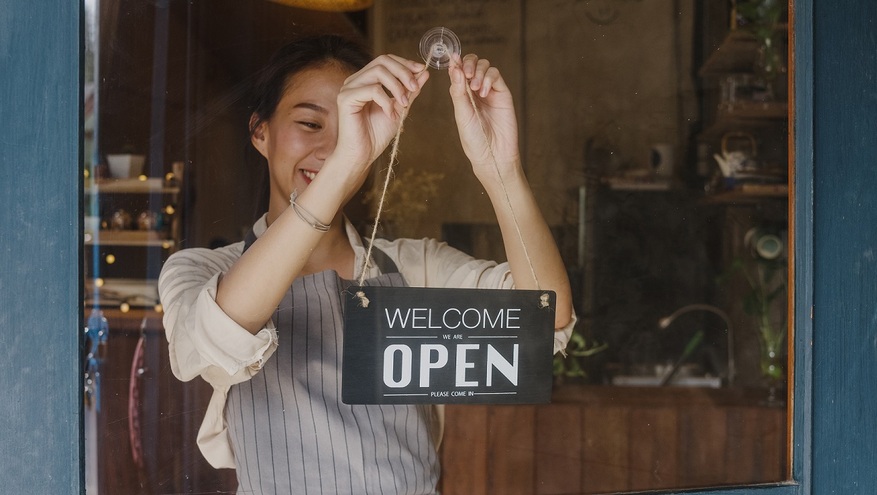In fiscal year 2023, the Small Business Administration (SBA) was a powerhouse of support for business owners, backing over 57,300 loans worth $27.5 billion in the United States. From start-ups and equipment purchases to expansions and debt refinancing, the SBA’s programs are clearly popular. With a flood of applicants vying for a share of the funding, competition can be fierce. A question naturally arises: Are you afraid of getting lost in the SBA shuffle when it comes to securing a loan?
The answer for many small business owners is, unfortunately, yes. Fundera, the financial resource arm of NerdWallet, reports that only 48 percent of small businesses fully meet their financing needs. This underscores the significant hurdle many face in securing funding, even with the SBA’s substantial resources.
But don’t let statistics discourage you! SBA loans can offer a path to success, and local community banks can be your partner in achieving it. Their personalized approach and deep understanding of your community’s economic landscape can make a significant difference in securing the funding you need. Remember, knowledge is power! Partnering with a local lender creates a valuable connection, helping you gain the information you need about SBA loans and turning your business into a success story.
Let’s get started by learning more about SBA loans.
What is an SBA Loan and How is it Different from Other Business Loans?
The SBA, or Small Business Administration, is a U.S. government agency dedicated to helping small businesses thrive. One of the key ways they do this is by offering loan guarantees through partnered lenders, such as Bank of Utah. That means the SBA doesn’t directly lend you money, but it vouches, or backs, a portion of the loan with a participating bank or financial institution.
Compared to traditional business loans, SBA loans have some distinct advantages:
- Increased Approval Chances: The SBA guarantee reduces the risk for lenders, making them more inclined to approve well-structured applications that highlight a sound business plan and financial projections. (We’ll explore how community banks can help you create a compelling application later in the article.)
- Easier to Qualify: While credit score is important, SBA loans often have less stringent minimum requirements compared to traditional loans. This allows lenders to factor in the overall health and potential of your business, as well.
- Lower Interest Rates: Due to the government guarantee, SBA loans typically come with lower interest rates than traditional business loans. This can mean significant savings over the life of your loan.
- Flexible Terms: SBA loans stand out for their extended repayment terms compared to many other loan options. This translates to lower monthly payments, allowing you to manage your cash flow more effectively. With this financial breathing room, you can focus on investing in your business growth without feeling overwhelmed by repayment pressure.
Who Qualifies as a Small Business for SBA Loans?
An important aspect of SBA loans is understanding whether your business qualifies for them. Key criteria you’ll need to meet includes:
- For-Profit Business: First, your business must be a for-profit entity operating legally within the United States or its territories.
- Exhausting Other Options: The SBA aims to support businesses that have explored other financing avenues. This means you’ll typically need to demonstrate that you’ve exhausted reasonable attempts to secure funding through personal assets, investments or traditional bank loans before turning to an SBA loan.
- Size Standards: Your business must meet the SBA’s size standards for your industry, as determined by your NAICS code. NAICS stands for North American Industry Classification System, and it is the standard used by the SBA to classify business establishments.
It’s important to note that these are just general guidelines. Even if your business falls outside the exact size standard, or you haven’t completely exhausted all other funding options, you may still be eligible for an SBA loan under special circumstances. For a definitive answer on your eligibility, it’s always best to consult with a lender who specializes in SBA loans. They can assess your specific situation and determine your eligibility for different programs.
What are the Different Types of SBA Loans?
The beauty of SBA loans lies in their variety. The SBA offers a range of loan programs designed to cater to different business needs and stages of growth. Here’s a glimpse into two of the most popular SBA loan programs:
- 7(a) Loan Program: This is the most versatile, offering loans for various business purposes such as working capital, equipment purchases, real estate and even business acquisitions.
- 504 Loan Program: This program focuses on fixed-asset financing, ideal for businesses looking to acquire major equipment or commercial property with long-term, fixed-rate financing.
Additional SBA loan programs are available depending on your specific industry or needs.
How Does an SBA Loan Work?
Understanding the mechanics of an SBA loan can seem complex, but the process can be broken down into manageable steps:
- Partnering with a Lender: Your first step is to find a lender that participates in SBA loan programs, one that can guide you through the process and help you choose the SBA loan program that best fits your needs.
- Crafting a Compelling Application: The SBA requires a detailed loan application package. This typically includes a business plan, financial projections and personal financial information. Work closely with your lender to ensure your application showcases the viability and potential of your business.
- SBA Guarantee and Approval: Once your application is complete, your lender will submit it to the SBA for review and potential guarantee. The SBA will assess your business and the loan request to determine eligibility. If approved, the SBA will guarantee a portion of the loan, making it more attractive to the lender.
- Loan Closing and Funding: Upon approval, your lender will handle the final loan closing procedures. This includes finalizing paperwork and ensuring you’ve met all your requirements. Once everything is finalized, the loan funds will be disbursed to your business.
- Repayment: You will repay the SBA loan directly to your lender, typically on a monthly basis, according to the agreed-upon terms. Make sure you understand the repayment schedule and interest rates associated with your loan. Remember: While the SBA offers a guarantee to the lender, you’ll be responsible for repaying the loan if your business defaults.
Why Partner with a Community Bank for Your SBA Loan?
Community banks offer distinct advantages for securing an SBA loan:
- Personalized Service: They’ll walk you through the different SBA loans, explaining which one best aligns with your needs. This personalized approach ensures you’re not just applying for any SBA loan, but the right SBA loan for your business, significantly increasing your chances of approval.
- Loan Experts: Community banks often have dedicated SBA specialists on staff. These experts have a deep knowledge of SBA loan requirements and the intricacies of the application process. They can guide you in gathering the necessary documentation, structuring your business plan for maximum impact and presenting your financial projections in a way that resonates. With their expertise, you can be confident your application displays the true potential and viability of your business.
- Local Knowledge: Community banks have a deep understanding of the local economic landscape and the specific challenges and opportunities faced by businesses in your area. This local knowledge can be a huge asset when crafting your loan application. They can help you tailor your business plan to highlight how your success will contribute to the growth of the community, making your application more attractive to the SBA.
- Shared Investment: Community banks view themselves as invested partners in the success of your business, not just a lender. They’re genuinely interested in seeing you thrive and will offer ongoing support beyond the loan approval process. This can include guidance on financial management and even connecting you with valuable resources within the community.
A Final Thought
SBA loans have fueled countless success stories, and yours could be next.
At Bank of Utah, we believe in fostering strong relationships with our local businesses. Our friendly SBA specialists are here to walk you through anything lending related, from exploring traditional loans to navigating the SBA loan application process. Learn more here.
 Brett Jensen is a senior vice president/SBA administrator at Bank of Utah. He works out of the City Creek Banking Center in Salt Lake City and helps businesses across the state with their SBA lending needs. A graduate of the University of Utah, Brett majored in business/commerce and is now dedicated to helping Utah’s small businesses thrive.
Brett Jensen is a senior vice president/SBA administrator at Bank of Utah. He works out of the City Creek Banking Center in Salt Lake City and helps businesses across the state with their SBA lending needs. A graduate of the University of Utah, Brett majored in business/commerce and is now dedicated to helping Utah’s small businesses thrive.




